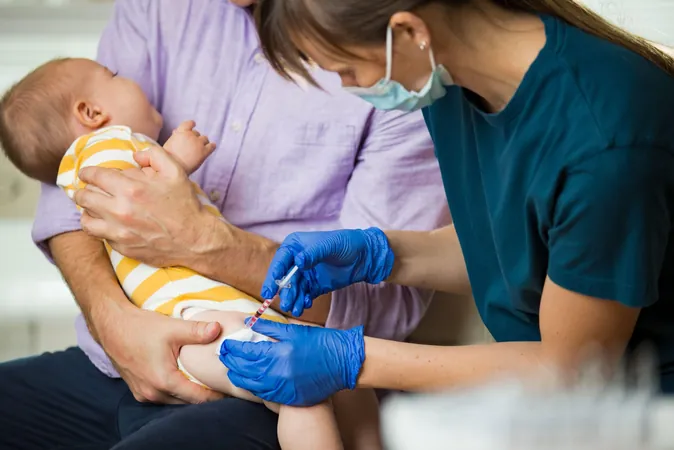
Revamping Immunization Policies: A New Hope Against RSV and Pneumococcal Disease
2025-07-18
Author: Daniel
Despite groundbreaking advancements in combating respiratory diseases, two major culprits—respiratory syncytial virus (RSV) and pneumococcal disease—continue to wreak havoc globally, especially among infants, young children, and the elderly.
At the recent European Society for Paediatric Infectious Diseases (ESPID) meeting in Bucharest, experts convened to discuss innovative immunization strategies aimed at tackling these diseases in nations of all income levels.
Unlocking New Opportunities for Health Protection
The rollout of new preventive measures, including vaccines, offers unprecedented chances to safeguard health. However, the true impact relies on successful implementation.
Countries that prioritize infrastructure, education, and equitable access are starting to close the gaps in health protection and turn scientific progress into tangible public health benefits.
RSV: A Persistent Threat to Children
First identified in the 1950s, RSV is still the leading cause of severe respiratory illnesses in children under one. Thankfully, innovative options for long-term protection are finally emerging.
Similarly, while pneumococcal disease—known for causing severe conditions like pneumonia and meningitis—has seen a reduction in many areas due to vaccination, the burden remains heavy in regions with poor coverage.
The Social Cost of Respiratory Illnesses
A U.S. study revealed that 68% of parents found their child's RSV battle negatively impacted their mental well-being, while around 20% had to leave work to manage caregiving duties. This highlights the significant socio-economic burden RSV inflicts on families.
In Europe, Professor Susanna Esposito illustrated the stress associated with RSV, noting that infants spend an average of six days in hospital, often requiring intensive care.
Challenges Faced by Older Adults
Older adults dealing with pneumonia and pneumococcal disease often face long recovery periods that affect their mobility and overall wellbeing, complicating their ability to care for dependent family members.
Rallying for Policy Change
Experts agree that addressing these public health challenges requires robust political will. Mark Chataway, the panel moderator, stressed the necessity of presenting compelling narratives to engage policymakers.
It's crucial to underscore the impact of RSV outbreaks on healthcare systems, particularly during peak seasons, to rally support for necessary interventions.
Communicating Complex Data Effectively
Professor Federico Martínon-Torres emphasized that epidemiological data must be simplified for politicians to grasp its implications quickly. Awareness of RSV has grown, yet the economic ramifications of pneumococcal disease are often overlooked.
Proactive Measures in Vaccine Implementation
Failure to act means unnecessary deaths, warned Professor Rudzani Muloiwa, who shared successful proactive strategies from South Africa to ensure readiness for RSV vaccinations.
Tackling Vaccine Hesitancy
Vaccine hesitancy remains a formidable barrier. By leveraging insights from the COVID-19 pandemic, advocates hope to promote RSV and pneumococcal disease prevention effectively.
A forthcoming Italian study suggests that parents may prefer monoclonal antibodies over vaccines, viewing them as a safer option, reflecting changed perceptions post-COVID.
Harnessing AI for Enhanced Immunization Strategies
Innovative discussions included the use of artificial intelligence to refine RSV prevention measures and optimize pneumococcal vaccination schedules, promising exciting developments ahead.
A Call for Unified Action
The panelists strongly advocated for building coalitions among healthcare experts, advocates, and the public to foster policies that prioritize immunization.
They highlighted Spain's effective RSV vaccination strategy as a model, attributing its success to early preparation, adequate funding, and strategic advocacy.
Ensuring Healthy Futures
In closing, panelists united in urging policymakers to elevate immunization efforts as a critical health priority. Professor Esposito passionately remarked, "Every hospitalization for a preventable disease signifies a missed opportunity. We must elevate awareness about preventive solutions."
This compelling discussion at the ESPID meeting serves as a vital roadmap for taking decisive public health actions against RSV and pneumococcal diseases. Such measures are essential not only for enhancing health in diverse economic landscapes but also for bolstering global health resilience.



 Brasil (PT)
Brasil (PT)
 Canada (EN)
Canada (EN)
 Chile (ES)
Chile (ES)
 Česko (CS)
Česko (CS)
 대한민국 (KO)
대한민국 (KO)
 España (ES)
España (ES)
 France (FR)
France (FR)
 Hong Kong (EN)
Hong Kong (EN)
 Italia (IT)
Italia (IT)
 日本 (JA)
日本 (JA)
 Magyarország (HU)
Magyarország (HU)
 Norge (NO)
Norge (NO)
 Polska (PL)
Polska (PL)
 Schweiz (DE)
Schweiz (DE)
 Singapore (EN)
Singapore (EN)
 Sverige (SV)
Sverige (SV)
 Suomi (FI)
Suomi (FI)
 Türkiye (TR)
Türkiye (TR)
 الإمارات العربية المتحدة (AR)
الإمارات العربية المتحدة (AR)